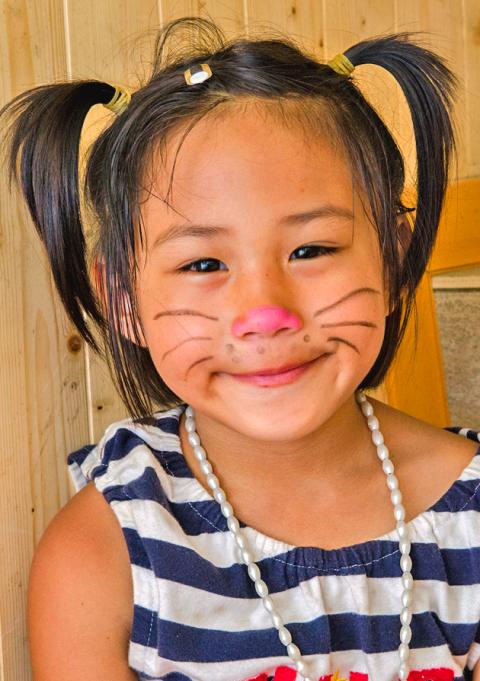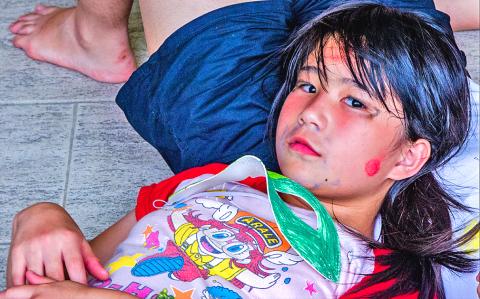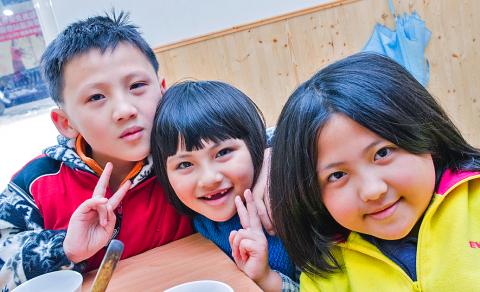Taiwan-born, California-raised social activist Daisy Lin (林黛西) is all heart and smiles as she explains her organization, the Bright Side Projects’ (臺灣嚮光協會) next workshop in Chingchuan (清泉), an Atayal village nestled in the mountains of Wufeng Township (五峰) in Hsinchu County. Tomorrow morning, in celebration of Bright Side’s two-and-a-half year involvement in the community, there will be tie-dye and arts and crafts stations, as well as a specially-prepared vegetarian feast with apple sliced lollipops dipped in melted chocolate and vegan caramel sauce for dessert.
For nearly a decade, Lin worked in global marketing and branding for luxury goods. Disillusioned, she quit her job one day and volunteered in several local non-profits throughout Taiwan.
“My job was to recreate what ‘needs’ were to a social being and then sell this packaged lifestyle,” Lin tells the Taipei Times. “However, the problems in the real world still existed and things were not getting better for people or the environment.”

Photo courtesy of Jonathan Burke
Drawing from her various passions such as healthy eating, as well as a focus on lifestyle, animal welfare, and environmental and social activism, Lin founded Bright Side Projects, a non-profit which strives to foster long-term community involvement in underprivileged communities.
Bright Side holds regular monthly events in places like Chingchuan where they match up a volunteer with one or two children from the Atayal community. Their activities include anything from yoga and modern dance to writing and directing screenplays. In addition, there are cooking demonstrations where children learn about nutrition and are introduced to healthy eating. Lin also makes sure that the children are aware of other cultures and customs around the world. As such, Bright Side organizes events like planting marigolds for the Day of the Dead, a Mexican holiday which brings together family and friends to remember the dearly departed.
“It’s a huge diversity of lessons that are being taught,” Lin says, “but one of the consistent themes encouraged is that we can make our own decisions.”

Photo courtesy of Jonathan Burke
SELF-EMPOWERMENT AND SALADS
One of the most successful events, Lin says, was their “Love Dogs” workshop, during which the children were split into groups to discuss how they would take care of dogs. The children were asked to illustrate their ideas and those drawings were then transferred onto silk screens to create t-shirts. A portion of the proceeds from the sales are currently going to helping stray animals in Taiwan.
This cyclical approach to self-empowerment has been very effective. As Lin says, “the kids create art, gain knowledge and are empowered to see how to turn that into a tool to help others.”

Photo courtesy of Jonathan Burke
In the summer of 2012, Lin became a vegetarian and has since been imparting her love for healthy eating to the children.
“When our meals are created, everyone gathers around so they know what ingredients are in the dish and who made it. It’s a bonding experience to give thanks, share the food and clean the dishes together,” Lin adds.
Saladay, a vegetarian restaurant, has sponsored many of their workshops since 2013. Fresh Bakery & Cafe, Taipei’s first vegan bakery, also caters delicious vegan pastries for Bright Side events. Finally, as a result of their recent gift drive, Bright Side has been able to provide families in Chinghcuan with access to organic food planted by local farmers.
While Lin admits that it can be quite a trek out to Chingchuan, do not fret the two-and-a-half hour commute (on a good day). Most importantly though, Lin says that “falling in love with Chingchuan and the kids is not difficult and occurs organically.”
GETTING THERE
Take the south-bound high speed rail (HSR) from Taipei Main Station to Hsinchu. From there, take a train or taxi from Hsinchu HSR to Siagongguan bus stop, transfer to the bus up to Chingchuan (last stop).

This is the year that the demographic crisis will begin to impact people’s lives. This will create pressures on treatment and hiring of foreigners. Regardless of whatever technological breakthroughs happen, the real value will come from digesting and productively applying existing technologies in new and creative ways. INTRODUCING BASIC SERVICES BREAKDOWNS At some point soon, we will begin to witness a breakdown in basic services. Initially, it will be limited and sporadic, but the frequency and newsworthiness of the incidents will only continue to accelerate dramatically in the coming years. Here in central Taiwan, many basic services are severely understaffed, and

Jan. 5 to Jan. 11 Of the more than 3,000km of sugar railway that once criss-crossed central and southern Taiwan, just 16.1km remain in operation today. By the time Dafydd Fell began photographing the network in earnest in 1994, it was already well past its heyday. The system had been significantly cut back, leaving behind abandoned stations, rusting rolling stock and crumbling facilities. This reduction continued during the five years of his documentation, adding urgency to his task. As passenger services had already ceased by then, Fell had to wait for the sugarcane harvest season each year, which typically ran from

It is a soulful folk song, filled with feeling and history: A love-stricken young man tells God about his hopes and dreams of happiness. Generations of Uighurs, the Turkic ethnic minority in China’s Xinjiang region, have played it at parties and weddings. But today, if they download it, play it or share it online, they risk ending up in prison. Besh pede, a popular Uighur folk ballad, is among dozens of Uighur-language songs that have been deemed “problematic” by Xinjiang authorities, according to a recording of a meeting held by police and other local officials in the historic city of Kashgar in

It’s a good thing that 2025 is over. Yes, I fully expect we will look back on the year with nostalgia, once we have experienced this year and 2027. Traditionally at New Years much discourse is devoted to discussing what happened the previous year. Let’s have a look at what didn’t happen. Many bad things did not happen. The People’s Republic of China (PRC) did not attack Taiwan. We didn’t have a massive, destructive earthquake or drought. We didn’t have a major human pandemic. No widespread unemployment or other destructive social events. Nothing serious was done about Taiwan’s swelling birth rate catastrophe.